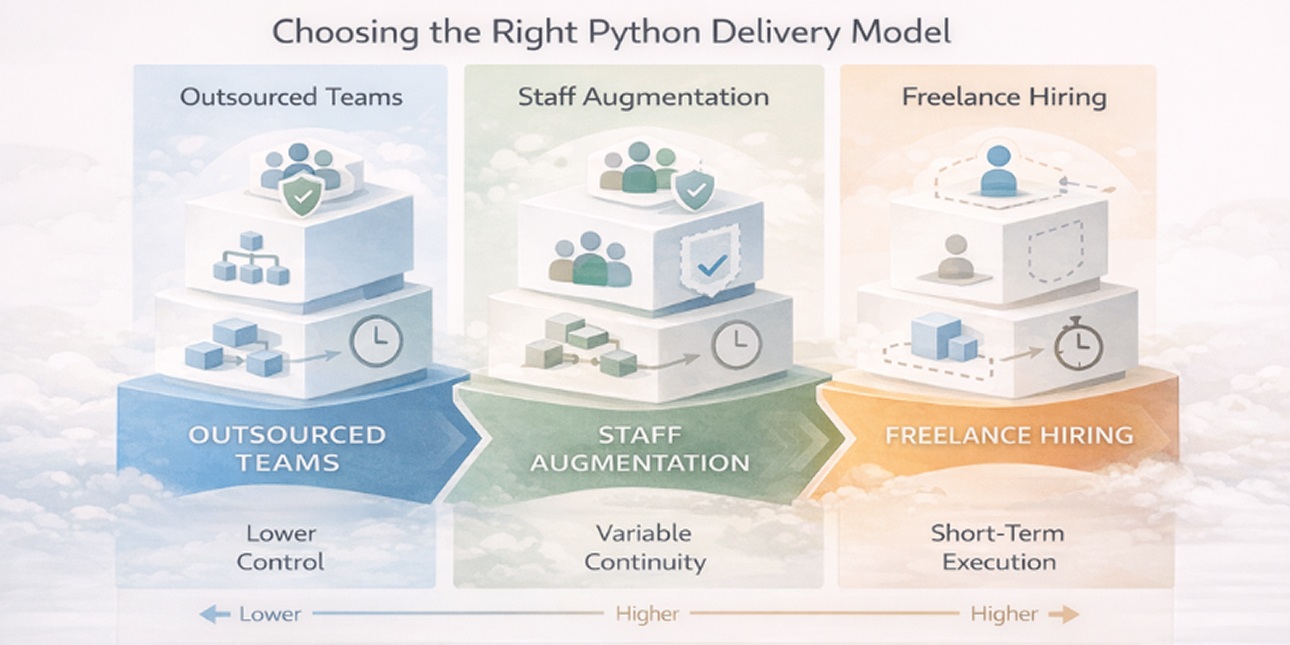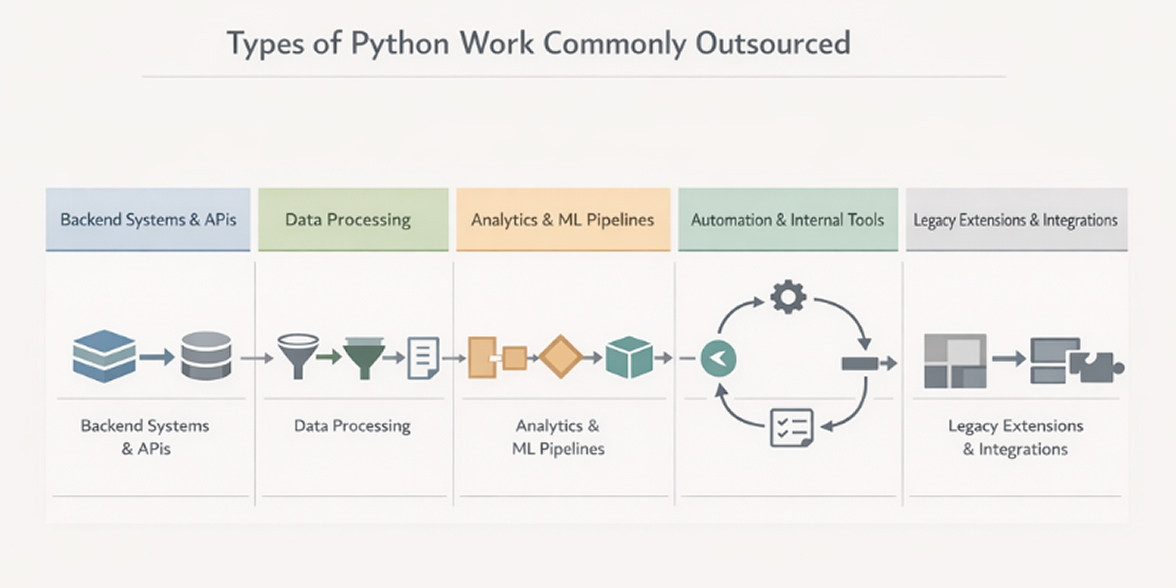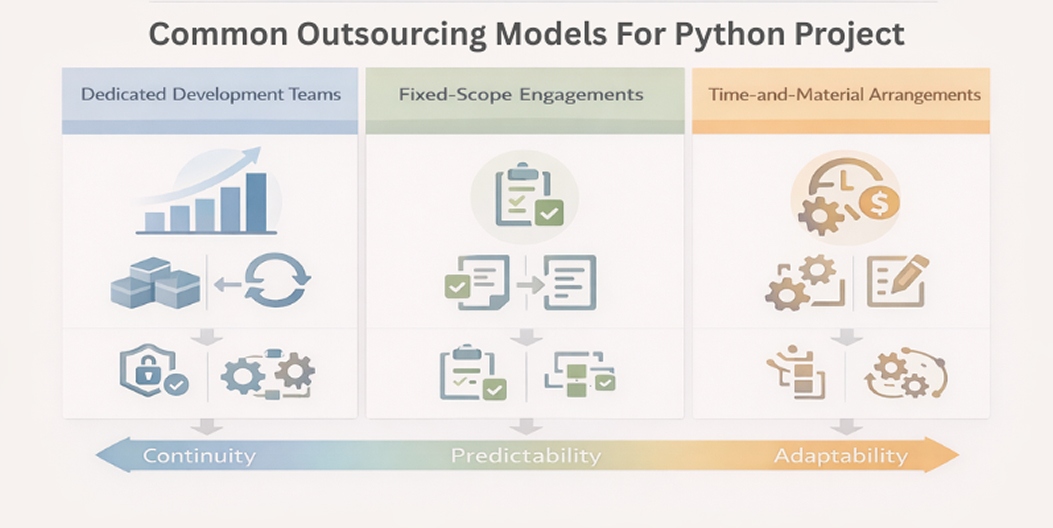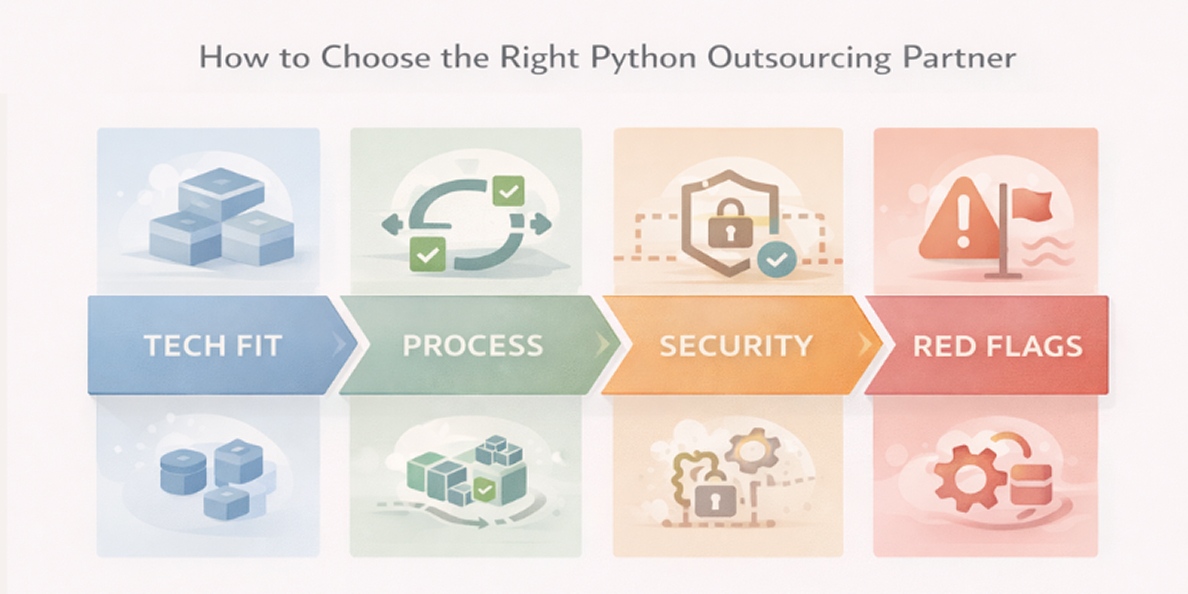Full Guide to Outsourcing Python Development

Outsourcing Python development is rarely a simple cost decision. Teams usually turn to it when delivery pressure increases, internal capacity hits limits, or specialized expertise is needed fast. The challenge is that outsourcing changes how work is planned, owned, and reviewed. Without clear expectations, it can introduce delays, quality gaps, or coordination overhead that offsets the initial gains.
According to Deloitte’s Global Outsourcing Survey, 70% of companies outsource to reduce costs, but over 50% report challenges related to governance, communication, and delivery alignment. The data shows that outsourcing itself isn’t the risk unclear decision-making and weak execution models are.
This guide breaks down outsourcing Python development from a practical, decision-focused lens. You’ll learn when outsourcing makes sense, what types of Python work are best suited for it, how pricing and engagement models actually work, and how product teams reduce risk while maintaining delivery control.

What outsourcing Python development means in practice
Before evaluating costs, vendors, or delivery models, teams need a clear understanding of what outsourcing Python development actually represents in practice. Many outsourcing issues arise because execution responsibilities are transferred without aligning on ownership, decision authority, or expectations.
This section exists to remove that ambiguity so teams can assess outsourcing with realistic assumptions. At a business level, outsourcing Python development means delegating defined engineering execution to an external team while retaining internal responsibility for product direction and outcomes.
The outsourced team is accountable for building against agreed requirements, technical constraints, and delivery timelines. Strategic decisions, however, do not move outside the organization.
To clarify where responsibility sits, it helps to distinguish execution from ownership.
Execution typically handled by the outsourcing partner
Implementing backend functionality, APIs, and services written in Python
Completing development tasks tied to documented scope and acceptance criteria
Performing maintenance, bug fixes, and refactoring within the agreed engagement
The outsourcing partner focuses on delivery within clearly defined boundaries. Their effectiveness depends heavily on the quality of requirements, feedback cycles, and decision turnaround provided by the client.
Ownership that remains internal
Defining product goals, priorities, and success metrics
Approving architectural decisions and technical trade-offs
Reviewing deliverables and accepting work for release
Outsourcing does not remove the need for internal leadership. Teams that retain clear ownership over decisions and direction tend to experience more predictable delivery and fewer coordination issues.
This section intentionally avoids comparing outsourcing to other hiring models or discussing pricing, locations, or engagement structures. Its purpose is to establish a shared understanding of what outsourcing entails before any further evaluation takes place.
Choosing the right Python delivery model
Before deciding how to structure an engagement, teams need to decide who should execute the work. Outsourcing, staff augmentation, and freelance hiring distribute control, responsibility, and coordination very differently. This section exists to help teams choose the delivery model that best aligns with their operating style and internal capacity.

Outsourced Teams
Outsourced teams operate as a coordinated unit managed by an external provider. The provider is responsible for staffing, internal coordination, and quality controls, while the client sets priorities, reviews deliverables, and makes final decisions. This model reduces internal management effort and is well suited for teams that need to scale execution without expanding headcount.
The primary trade-off is reduced day-to-day control over individual contributors. Instead of managing tasks at a granular level, teams rely on defined processes, review checkpoints, and outcome-based oversight. When expectations and ownership boundaries are clear, this structure supports consistent delivery with lower internal overhead.
Staff Augmentation
Staff augmentation adds individual Python developers directly into an existing internal team, following a staff augmentation approach that emphasizes internal control and oversight.
These developers work within internal tools, processes, and workflows and are managed day to day by the client. This approach provides a high degree of control and close integration with internal teams.
The trade-off is increased management responsibility. Internal leads must handle task allocation, reviews, and coordination, which can strain teams that are already operating near capacity. Staff augmentation works best when internal processes are mature and hands-on oversight is feasible.
Freelance Hiring
Freelance hiring is typically used for short, clearly scoped tasks that can be executed independently. Freelancers manage their own execution and timelines, which can make this model efficient for isolated work such as scripts, small integrations, or one-off automation.
However, freelancers usually offer limited continuity and shared context. As scope grows or coordination needs increase, maintaining consistency and accountability becomes more difficult. For this reason, freelance hiring is generally less suitable for complex or long-running Python development efforts.
Each model carries distinct trade-offs:
Higher control generally requires higher internal management effort
Greater continuity usually comes from team-based models rather than individuals
Reduced oversight shifts more responsibility to the delivery structure itself
Outsourced teams are often the better choice for sustained execution where internal focus is limited. Staff augmentation suits teams that need control and already have mature processes in place. Freelance hiring works best for contained tasks where long-term ownership and continuity are not critical.
When outsourcing Python development makes sense
Outsourcing Python development works best when it addresses a specific delivery constraint rather than serving as a default response to workload pressure. This section helps teams evaluate whether outsourcing is the right execution choice based on how their product, timelines, and internal teams actually operate.
Capacity constraints and team saturation
Internal engineering teams are often stretched across feature development, maintenance, and operational responsibilities at the same time. When additional initiatives are introduced without room to reprioritize, progress slows across the board. Outsourcing can help relieve this pressure by taking on well-defined execution work while allowing internal teams to stay focused on core priorities.
This situation typically shows up when:
Internal teams are fully allocated across multiple initiatives
Maintenance and operational work compete with roadmap features
Hiring timelines cannot keep pace with incoming work
In these cases, outsourcing provides execution capacity without forcing disruptive trade-offs inside the team.
Delivery timelines and execution pressure
Fixed launch dates, customer commitments, or contractual obligations often leave little flexibility for hiring cycles or extended onboarding. When timelines are immovable, internal teams may struggle to absorb additional work without slowing delivery elsewhere. Outsourcing can increase throughput by enabling parallel development, as long as requirements are stable enough to support distributed execution without constant rework.
Short-term or specialized Python expertise
Some initiatives require Python expertise that internal teams may not need on an ongoing basis. This commonly includes work such as data processing pipelines, automation-heavy workflows, or integration-focused tasks.
Outsourcing allows teams to bring in focused expertise for a defined period without committing to long-term hires for skills that are only temporarily required.
This approach is most effective when:
The expertise is needed for a specific initiative or phase
The work has clear inputs, outputs, and acceptance criteria
Long-term ownership will remain with the internal team
When outsourcing introduces friction
Outsourcing tends to struggle when work depends heavily on undocumented business logic, rapid iteration, or continuous internal feedback. Projects that change direction frequently or rely on deep, evolving context are often better handled by in-house teams that already share that understanding and can adapt quickly without coordination overhead.
A practical outsource vs. in-house decision lens
In practice, outsourcing works best when scope and outcomes can be defined with reasonable clarity and execution can move forward without daily course correction.
When long-term ownership, continuous iteration, and deep internal context are critical, in-house development is often the safer option. The strongest results come from using outsourcing to complement internal teams by filling execution gaps rather than attempting to replace core product ownership.
Types of Python work commonly outsourced
Not all Python development is equally suited for outsourcing. The strongest results usually come from outsourcing work that can be clearly defined, reviewed independently, and delivered without constant directional input. This section helps teams identify which types of Python work are appropriate to hand off and which are better kept close to the core product team.

Backend systems and APIs
Backend development is one of the most commonly outsourced categories of Python work, particularly when teams evaluate the cost and effort of building Python-based systems internally.
This includes building or extending service layers, implementing APIs, and handling business logic that interacts with databases or external systems. Outsourcing works well here when boundaries are clearly defined and backend components can be developed and tested in parallel with other product work.
This type of work is usually a good outsourcing fit when:
API contracts and integration points are well documented
Performance and reliability expectations are clearly defined
Backend components can be reviewed independently of UI changes
When these conditions are met, external teams can deliver predictable results without slowing overall development.
Data processing, analytics, and ML pipelines
Python is widely used for data workflows, analytics processing, and machine learning pipelines, which makes this a frequent outsourcing candidate when teams need access to experienced AI and ML engineers to execute defined data workloads.
Teams often outsource the implementation of ETL pipelines, reporting jobs, or model execution layers once data sources and evaluation criteria are established. Outsourcing is less effective for exploratory analysis or research-heavy work, where requirements shift rapidly and depend heavily on internal context.
Automation and internal tools
Automation scripts and internal tools are particularly well suited for outsourcing because they are typically self-contained and outcome-driven. This category includes workflow automation, reporting utilities, data cleanup jobs, and operational scripts that support internal teams.
These projects usually have clear success criteria and limited long-term dependency, making them easier to hand off without introducing coordination overhead.
Legacy extensions and integrations
Teams often outsource work related to extending, stabilizing, or integrating existing Python systems. This can include adding new features to legacy applications, improving reliability, or connecting older systems with newer services.
Outsourcing tends to work best here when:
The existing codebase is reasonably documented
Review and quality checks are in place to maintain consistency
The goal is incremental improvement rather than major redesign
Across all these categories, the deciding factor is clarity. Python work that can be expressed in terms of defined inputs, expected outputs, and review checkpoints is typically a strong outsourcing candidate.
Work that relies on constant iteration, shifting priorities, or deep product intuition is usually better handled in-house.
Common outsourcing models for Python projects
Once a team decides to outsource Python development, the next critical decision is how the engagement should be structured. The outsourcing model determines how work is planned, how decisions are made, and how changes are handled over time. A mismatch here often creates friction even when the technical work itself is solid.

Dedicated development teams
A dedicated team model assigns a group of Python developers to work exclusively on a product for an extended period. Although the team is employed and managed by the provider, it operates as a long-term extension of the client’s engineering function.
This approach is well suited to products with ongoing development needs where continuity and accumulated context matter.
This model tends to work best when:
Development is continuous rather than project-based
Product knowledge needs to build over time
Internal teams want to retain control over priorities and direction
The main trade-off is flexibility. Scaling the team up or down usually requires adjustment to the engagement rather than happening instantly.
Fixed-scope engagements
Fixed-scope outsourcing is used when requirements, timelines, and deliverables can be defined with a high level of confidence. The provider is responsible for delivering agreed outcomes within a predefined framework, and success is measured against milestones set at the outset.
This model offers predictability, but it is less forgiving when requirements change. Scope adjustments typically require renegotiation, which can slow progress if change is frequent. Fixed-scope engagements are most effective for contained initiatives with a clear start and end point.
Time-and-material arrangements
Time-and-material engagements are billed based on actual effort rather than predefined deliverables. This structure is useful when scope is expected to evolve or when requirements cannot be fully defined upfront.
Teams often choose this model when:
Priorities are likely to shift as work progresses
Discovery and implementation happen in parallel
Flexibility is more important than cost certainty
The trade-off is reduced budget predictability, which makes active prioritization and oversight essential.
Understanding the trade-offs
Each outsourcing model distributes ownership, flexibility, and change management differently. Dedicated teams emphasize continuity, fixed-scope engagements emphasize predictability, and time-and-material arrangements emphasize adaptability.
Selecting the right model depends on how stable requirements are, how frequently priorities change, and how much internal oversight the team can realistically provide.
Outsourcing models compared at a glance
How pricing for Python outsourcing actually works
Pricing is often the most misleading part of Python outsourcing discussions. Many teams compare hourly rates without accounting for the structural factors that determine how much work gets delivered, how often it needs rework, and how much internal effort is required to keep projects moving.
This section breaks pricing down into its real components so teams can evaluate cost realistically instead of relying on surface-level comparisons.
Scope clarity and definition
Scope clarity is one of the strongest predictors of cost stability. When requirements are clearly defined, teams spend more time building and less time clarifying, revising, or undoing work. Even small ambiguities can compound over time, increasing coordination effort and delivery cycles.
Cost tends to rise when:
Requirements are loosely defined or frequently revised
Acceptance criteria are unclear or change midstream
Dependencies and integrations are discovered late
Clear scope does not mean rigid documentation, but it does require agreement on what success looks like before execution begins.
Developer seniority and team composition
Hourly rates vary significantly based on developer seniority, but higher rates do not automatically translate to higher total cost. Senior Python developers typically make architectural decisions faster, require less supervision, and handle edge cases with fewer iterations.
Lower-cost, junior-heavy teams may appear attractive initially, but they often increase overall cost through:
Slower decision-making
Higher review and correction overhead
Greater reliance on client-side guidance
For complex or integration-heavy work, the effective cost of senior expertise is often lower over the full project lifecycle.
Domain and system complexity
Projects that involve complex business rules, regulated data, or multiple system integrations carry inherent cost overhead regardless of who builds them. Domain complexity affects planning effort, testing depth, and coordination needs.
Examples that typically increase cost include:
Financial, healthcare, or compliance-sensitive workflows
Data-heavy systems with validation or audit requirements
Legacy environments with limited documentation
These factors increase effort even when the underlying Python development is straightforward.
Regional Context
Regional labor markets influence baseline rates, but geography alone does not determine value. Differences in time zones, communication cadence, and delivery practices often have a greater impact on cost than hourly pricing.
At a high level:
Lower-rate regions may require more coordination and oversight
Higher-rate regions may reduce review cycles and management effort
Evaluating a region purely on cost without factoring in delivery efficiency often leads to misleading conclusions.
Industry demand reinforces this dynamic. According to the Stack Overflow Developer Survey, experienced Python developers continue to be in high demand across industries, which keeps senior talent competitively priced regardless of location.
As a result, higher hourly rates often reflect delivery efficiency and decision quality rather than inflated cost. The table below summarizes how common cost drivers and typical US market rates influence total outsourcing cost in practice.
Key cost drivers and pricing context for Python outsourcing
These ranges illustrate why total cost is driven more by scope clarity, seniority, and delivery efficiency than by hourly rates alone.
Why the lowest hourly rate often increases total cost
The lowest advertised rate frequently masks hidden costs that surface later. Additional review cycles, slower progress, extended timelines, and increased internal management effort all contribute to higher total spend.
Industry research supports this pattern. Deloitte’s Global Outsourcing Survey consistently highlights governance and coordination as major contributors to cost overruns, while the Stack Overflow Developer Survey shows sustained demand for experienced Python developers, keeping senior talent competitively priced across markets.
In practice, the most predictable cost outcomes come from balancing scope clarity, appropriate seniority, and delivery efficiency rather than optimizing for the lowest visible rate.
How to choose the right Python outsourcing partner
Choosing a Python outsourcing partner is primarily a risk-management decision. While technical skill is important, most delivery failures stem from misalignment in expectations, process, or ownership rather than gaps in coding ability.
The goal is not to find the most impressive vendor but to identify teams that can operate predictably under real delivery constraints.

Technical fit vs domain expertise
A partner’s technical fit should be evaluated against the realities of your existing systems, not Python in isolation, especially when assessing Python development solutions that must operate within established architectures.
This includes familiarity with similar architectures, data flows, and integration patterns. Equally important is domain expertise. Teams that understand the business context behind the code are better equipped to make sound trade-offs and avoid misinterpretation.
Strong alignment usually becomes clear when a partner can explain why certain approaches were chosen in past projects rather than simply listing tools or frameworks. Teams without domain familiarity often deliver technically correct solutions that require rework once business constraints surface.
Communication structure and process maturity
Consistent delivery depends on how work is planned, reviewed, and adjusted over time. Process maturity often matters more than individual developer skill because it determines how well a team maintains momentum when priorities shift or issues arise.
At a minimum, teams should understand:
How work is broken down, tracked, and reviewed
How progress, risks, and dependencies are communicated
How feedback and change requests are handled
When these structures are unclear or improvised, coordination overhead increases and small issues tend to escalate quickly.
Security, IP protection, and access control
Security and intellectual property risks usually emerge from unclear boundaries rather than intent. Before work begins, teams should understand how access to repositories, environments, and data is controlled, and how ownership of code and deliverables is defined.
Practical safeguards include limiting access to only what is required for delivery, clearly defining ownership of all outputs, and treating security practices as part of the delivery process rather than an afterthought. These measures protect both operational integrity and long-term ownership.
Early warning signs and red flags
Certain patterns often indicate elevated risk early in the evaluation process. These issues tend to appear during discussions and proposals, well before development starts.
Watch for:
Vague explanations of delivery process or decision ownership
Overconfident timelines without discussion of trade-offs
Reluctance to explain past challenges or course corrections
Emphasis on speed without clarity on review and quality controls
Partners that acknowledge constraints and explain how they manage trade-offs are generally more reliable than those that promise frictionless delivery.
This section intentionally avoids certifications and vendor comparisons. The focus is on identifying the characteristics that signal whether a partner can deliver reliably within real-world constraints.
Evaluating location strategy for Python outsourcing
Where an outsourcing team is located influences cost, communication, and delivery rhythm, but location should be treated as a strategic trade-off rather than a default preference.
Teams often choose offshore, nearshore, or onshore models based on assumptions rather than how those choices affect collaboration and execution over time. This section helps teams evaluate location in a way that supports delivery rather than introducing hidden friction.
Key factors that influence location decisions
Location decisions are usually driven by a small set of practical considerations. While cost differences are often the most visible factor, delivery efficiency is shaped just as much by time zone alignment and collaboration requirements.
Cost Sensitivity
Offshore teams generally come with lower baseline rates, while onshore teams reflect higher local operating costs. However, total cost is influenced less by hourly rates and more by the level of coordination the work requires.
Projects that demand frequent clarification or hands-on oversight tend to see reduced savings regardless of where the team is based.
Cost sensitivity becomes especially relevant when:
Work can be clearly scoped and reviewed independently
Oversight effort is predictable and limited
In these cases, lower baseline rates are more likely to translate into actual savings.
Time Zone Overlap
Time zone alignment directly affects how quickly teams can resolve questions and unblock progress. Limited overlap forces greater reliance on asynchronous communication, which can slow feedback cycles and extend timelines. Shared working hours make it easier to clarify requirements and address issues before they compound.
Time zone overlap matters most when:
Decisions are frequent or time-sensitive
Feedback loops need to be short
As collaboration intensity increases, overlap becomes a stronger determinant of delivery speed.
Collaboration Requirements
Some Python work can progress independently with minimal interaction, while other initiatives depend on frequent discussion and shared decision-making. Projects involving rapid iteration, evolving requirements, or close coordination with internal stakeholders benefit from tighter collaboration windows.
When collaboration is central to success:
Proximity or overlap often outweighs cost considerations
Coordination efficiency becomes a competitive advantage
Balancing collaboration needs with cost and time zone constraints leads to more stable delivery outcomes.
When is nearshoring the better option?
Nearshoring often works well when teams need meaningful time zone overlap but want to avoid the full cost of onshore delivery, similar to how distributed development centers are structured for long-term collaboration. It suits projects that require regular planning, shared reviews, or ongoing coordination without constant real-time supervision.
Nearshoring is particularly effective when:
Daily or near-daily collaboration is required
Long-term continuity matters, but full onshore integration is unnecessary
This model often strikes a balance between communication efficiency and cost control.
When onshore teams still make sense?
Onshore outsourcing remains a strong option for work that demands tight coordination, frequent internal interaction, or deep alignment with business stakeholders. This is common for initiatives involving sensitive data, regulatory constraints, or rapidly shifting priorities.
Onshore teams are typically justified when:
Decision latency would materially affect outcomes
Stakeholder access and trust are critical
Although rates are higher, reduced coordination friction can offset the difference in complex environments.
Using location as a strategic lever
No single location model is universally superior. Offshore, nearshore, and onshore approaches each introduce different trade-offs in cost, communication, and control.
Teams that treat location as a strategic variable rather than a default choice tend to achieve more predictable collaboration and fewer delivery surprises over time.
How teams reduce risk when outsourcing Python development
Most outsourcing failures are not caused by poor technical skill. They happen because expectations, ownership, and quality controls are left implicit until problems surface.
This section focuses on the execution practices that help teams reduce risk once outsourcing begins, especially in areas that are often overlooked during planning.
Clear scope definition and success criteria
Risk reduction starts before development begins. Teams that invest time in defining scope and success criteria upfront create fewer opportunities for misalignment later. This does not require exhaustive documentation, but it does require shared understanding of what will be delivered and how progress will be evaluated.
Risk increases when:
Scope is described in broad or ambiguous terms
Success is measured informally or subjectively
Clear outcomes, acceptance criteria, and boundaries give external teams the context they need to execute without constant clarification.
Pilot projects and phased onboarding
Jumping directly into a large engagement increases exposure if assumptions are wrong. Pilot projects and phased onboarding allow teams to test collaboration, communication, and delivery quality with limited risk, especially when working with distributed software development teams.
A pilot phase helps teams evaluate:
How accurately requirements are interpreted
How issues and feedback are handled
Whether delivery pace matches expectations
This approach creates a natural checkpoint before committing to a broader scope or longer timelines.
Code ownership and review discipline
Outsourcing execution does not mean outsourcing accountability for code quality. Internal teams should retain ownership of architectural decisions and establish clear review expectations from the start.
Effective risk control here depends on:
Defined code ownership and review responsibility
Consistent standards for readability, testing, and structure
Regular reviews prevent quality issues from accumulating and make it easier to maintain the codebase long after the engagement ends.
Documentation and continuity practices
Knowledge loss is one of the most common long-term risks in outsourced development. When context lives only in conversations or individual contributors, continuity suffers as teams change.
Reducing this risk requires treating documentation as an ongoing activity rather than a final deliverable. Design decisions, assumptions, and workflows should be recorded incrementally so understanding is shared and transferable.
Ongoing quality and delivery checkpoints
Risk management is not a one-time activity. Regular checkpoints help teams identify issues early, when they are easier and less expensive to address. These checkpoints focus on delivery consistency rather than micromanagement.
Teams benefit from reviewing:
Progress against agreed milestones
Quality trends over time, not just individual deliverables
Alignment between current work and original objectives
When quality and progress are reviewed continuously, outsourcing becomes more predictable and easier to correct before problems escalate.
Key takeaways for decision-makers
By the end of an outsourcing evaluation, most decisions hinge on clarity rather than discovery. This section distills the guide into a small set of conclusions that help decision-makers validate whether outsourcing Python development aligns with their constraints, expectations, and operating reality.
Outsourcing should solve a specific constraint.
Outsourcing is most effective when it addresses a clearly defined problem rather than acting as a general delivery fallback. Teams see the strongest outcomes when outsourcing is used to resolve constraints such as
Capacity gaps that cannot be addressed quickly through hiring
Fixed timelines that require parallel execution
Short-term needs for specialized Python expertise
Using outsourcing as a substitute for ownership or strategy typically introduces friction instead of efficiency.
Engagement structure matters as much as technical skill.
Technical capability alone does not determine success. The way work is scoped, reviewed, and governed has a greater impact on outcomes than location or tools.
Teams that establish structure early tend to reduce ambiguity, improve accountability, and maintain momentum as complexity increases. This is often where engagements succeed or fail, regardless of developer experience.
Hourly rates are not a proxy for total cost.
Comparing rates in isolation leads to misleading conclusions. Total cost is shaped more by execution dynamics than by pricing alone, including:
How clearly scope and success criteria are defined
The seniority required to make sound technical decisions
The level of coordination and review effort involved
Teams that optimize for the lowest visible rate often incur higher costs through rework, delays, and increased internal management effort.
Location Is a trade-off, not a preference
Offshore, nearshore, and onshore models each introduce different trade-offs. Time zone overlap and collaboration needs frequently outweigh base rate differences when delivery speed and reliability are important.
Location decisions are most effective when aligned with how closely teams need to work together, not with assumptions about cost alone.
Risk Is reduced through execution discipline
Most outsourcing risks are mitigated through consistent execution practices rather than contractual safeguards. Clear ownership, regular reviews, documentation, and phased onboarding create early visibility into issues and prevent small problems from escalating.
Teams that treat these practices as ongoing responsibilities tend to experience fewer surprises.
Clarity and consistency drive successful outcomes
Taken together, these points reinforce a simple principle: successful Python outsourcing depends on deliberate choices made early and reinforced consistently during execution.
When teams align intent, structure, and oversight, outsourcing becomes a controlled extension of delivery rather than a source of uncertainty.
